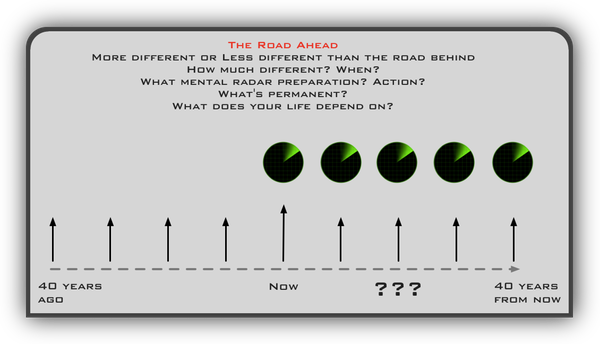
… means navigating a world moving relentlessly toward unimagined futureS ↓ ↑

pics
How can we work toward horizons that aren’t on our mental radar — at the right point in time? ↑ ↓
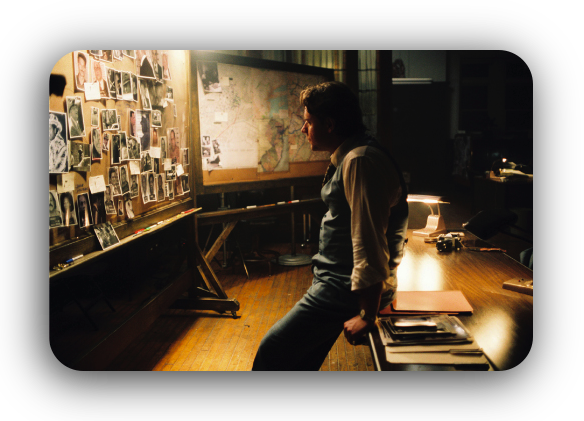
“Cleverness is sharp focus, wisdom ↑ is wide angle.
Wisdom is largely about ‘broadening’ perception.
Most of the mistakes in thinking are mistakes in perception.
 Seeing only part of the situation.
Seeing only part of the situation.
 Jumping to conclusions.
Jumping to conclusions.
 Misinterpretation caused by feelings.
Misinterpretation caused by feelings.
“There are three types of ‘broad’.
 The first type of broad is to do with ‘width’.
The first type of broad is to do with ‘width’.
How widely do we see?
This means taking into account different factors, different people, different values and different needs.
 The second type of broad is to do with ‘depth’.
The second type of broad is to do with ‘depth’.
This means looking forward and looking backwards.
We look backwards in time to seek explanations and reasons for what is before us.
We look backwards to examine past experiences, both our own and those of other people.
We look forward to see the consequences of what is before us.
This might be prediction in terms of what may happen.
It may also be looking for the consequences of any action we are contemplating.
We look forward from the immediate consequences to the long-term consequences
 The third type of broad is to do with ‘richness’.”
The third type of broad is to do with ‘richness’.”
Here we open up alternatives and different ways of looking at things.
We seek out the existing alternatives.
We imagine the different viewpoints of other people.
We make an effort to generate further alternatives.
These are alternatives of perception and alternatives of action.
We look for ‘might be’ and for ‘possibly’.
We go beyond ‘what is’.
… so the aim of wisdom is to end up with a perception that is wider, deeper and richer.” ↓ Edward de Bono
The memo THEY don’t want you to SEE ↑ ↓
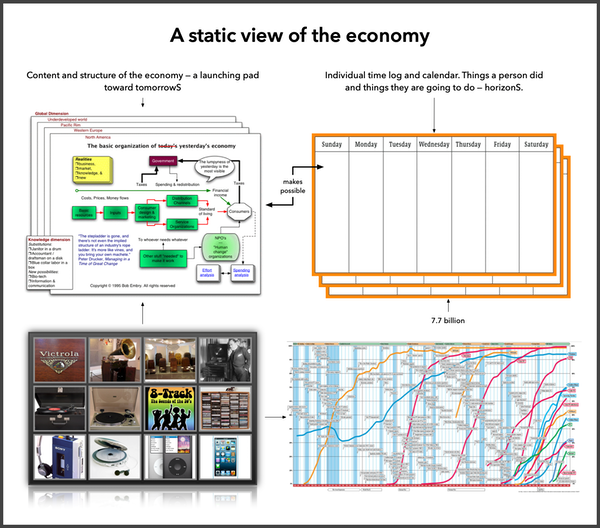
Larger composite ::: Economic & content and structure ::: Adoption rates: one & two ::: broader
Managing Oneself !!! — an overview PDF
More and more people in the workforce — and most knowledge workers — will have to MANAGE THEMSELVES.
They will have to place themselves where they can make the greatest contribution; they will have to learn to develop themselves.
They will have to learn to stay young and mentally alive during a fifty-year working life.
They will have to learn how and when to change what they do, how they do it and when they do it.
Knowledge workers are likely to outlive their employing organization.
Even if knowledge workers postpone entry into the labor force as long as possible — if, for instance, they stay in school till their late twenties to get a doctorate — they are likely, with present life expectancies in the developed countries, to live into their eighties.
And they are likely to have to keep working, if only part-time, until they are around seventy-five or older.
The average working life, in other words, is likely to be fifty years, especially for knowledge workers.
But the average life expectancy of a successful business is only thirty years — and in a period of great turbulence such as the one we are living in, it is unlikely to be even that long.
Even organizations that normally are long-lived if not expected to live forever — schools and universities, hospitals, government agencies — will see rapid changes in the period of turbulence we have already entered.
Even if they survive — and a great many surely will not, at least not in their present form — they will change their structure, the work they are doing, the knowledges they require and the kind of people they employ.
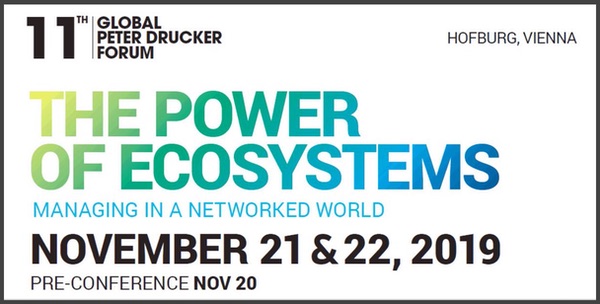
Post-capitalist executive ↑
Increasingly, therefore, workers, and especially knowledge workers, will outlive any one employer, and will have to be prepared for more than one job, more than one assignment, more than one career.
So far, this book has dealt with changes in the environment: in society, economy, politics, technology.
This concluding chapter deals with the new demands on the individual.
The very great achievers, a Napoleon, a Leonardo da Vinci, a Mozart, have always managed themselves.
This in large measure made them great achievers.
But they were the rarest of exceptions.
And they were so unusual, both in their talents and in their achievements, as to be considered outside the boundaries of normal human existence.
Now even people of modest endowments, that is, average mediocrities, will have to learn to manage themselves.
Knowledge workers, therefore, face drastically new demands:
They have to ask:
Who Am I?
What Are My Strengths?
HOW Do I Work?
They have to ask: Where Do I Belong?
They have to ask: What is My Contribution?
They have to take Relationship Responsibility.
They have to plan for the Second Half of Their Lives.
... snip, snip ...
The Second Half of Your Life
As said before: For the first time in human history, individuals can expect to outlive organizations.
This creates a totally new challenge: What to do with the second half of one’s life?
One can no longer expect that the organization for which one works at age thirty will still be around when one reaches age sixty.
But also, forty or fifty years in the same kind of work is much too long for most people.
They deteriorate, get bored, lose all joy in their work, “retire on the job” and become a burden to themselves and to everyone around them.
This is not necessarily true of the very top achievers such as very great artists.
Claude Monet (1840-1926), the greatest Impressionist painter, was still painting masterpieces in his eighties, and working twelve hours a day, even though he had lost almost all his eyesight.
Pablo Picasso (1881-1973), perhaps the greatest Post-Impressionist painter, similarly painted till he died in his nineties and in his seventies invented a new style.
The greatest musical instrumentalist of this century, the Spanish cellist Pablo Casals (1876-1973), planned to perform a new piece of music and practiced it on the very day on which he died at age ninety-seven.
But these are the rarest of exceptions even among very great achievers.
Neither Max Planck (1858-1947) nor Albert Einstein (1879-1955), the two giants of modern physics, did important scientific work after their forties.
Planck had two more careers.
After 1918— aged sixty — he reorganized German science.
After being forced into retirement by the Nazis in 1933, he, in 1945, almost ninety, started once more to rebuild German science after Hitler’s fall.
But Einstein retired in his forties to become a “famous man.”
There is a great deal of talk today about the “mid-life crisis” of the executive.
It is mostly boredom.
At age forty-five most executives have reached the peak of their business career and know it.
After twenty years of doing very much the same kind of work, they are good at their jobs.
But few are learning anything anymore, few are contributing anything anymore and few expect the job again to become a challenge and a satisfaction.
Manual workers who have been working for forty years — in the steel mill for instance, or in the cab of a locomotive — are physically and mentally tired long before they reach the end of their normal life expectancy, that is, well before they reach even traditional retirement age.
They are “finished.”
If they survive — and their life expectancy too has gone up to an average of seventy-five years or so — they are quite happy spending ten or fifteen years doing nothing, playing golf, going fishing, engaging in some minor hobby and so on.
But knowledge workers are not “finished.”
They are perfectly capable of functioning despite all kinds of minor complaints.
And yet the original work that was so challenging when the knowledge worker was thirty has become a deadly bore when the knowledge worker is fifty and still he or she is likely to face another fifteen if not another twenty years of work.
To manage oneself, therefore, will increasingly require preparing oneself for the second half of one’s life.
(The best books on this subject are by Bob Buford — a very successful businessman who himself has created his own second half of life.
They are Half Time [Grand Rapids: Zondervan, 1994] and Game Plan [Grand Rapids: Zondervan, 1997].)
... snip, snip ...
People who manage the “second half” may always be a minority only.
The majority may keep doing what they are doing now, that is, to retire on the job, being bored, keeping on with their routine and counting the years until retirement.
But it will be this minority, the people who see the long working-life expectancy as an opportunity both for themselves and for society, who may increasingly become the leaders and the models.
They, increasingly, will be the “success stories.” continue

Navigating a world moving relentlessly
toward unimagined futureS
… requires a broad overall view
Larger view ↓
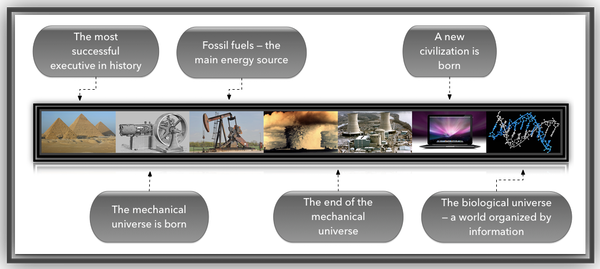
↑ Most successful executive … ::: … organized by information ↑
“For almost nothing in our educational systems prepares people
for the reality in which they will live, work, and
become effective” — Druckerism and intellectual capitalist
Ecological awareness
Supplemental awareness PDFs
Peter Drucker’s Views of Developmental Directions
Individual in entrepreneurial society
Danger of too much planning
The unexpected success

Read more about broad and related concepts.
 Perception
Perception
 Now and then the ‘edge effect’
Now and then the ‘edge effect’
 Truth, certainty and arrogance
Truth, certainty and arrogance
 The power of possibility
The power of possibility
 Values
Values
 Contrary and Contradiction
Contrary and Contradiction
 Hostage, Slave, Prisoner and Puppet
Hostage, Slave, Prisoner and Puppet
 I, We and Identity
I, We and Identity
 Contribute
Contribute
 The beach and the road
The beach and the road
 Wise about wisdom (book summary chapter)
Wise about wisdom (book summary chapter)
 Awareness
Awareness
 Broad
Broad
 Logic Bubble
Logic Bubble
 Possibly
Possibly
 Alternatives
Alternatives
 Plurality
Plurality
 Parallel Thinking
Parallel Thinking
 Choice
Choice
 Emotions and Feelings
Emotions and Feelings
 Judgement
Judgement
 Design
Design
 A new super-pattern: What would Merlin do here?
A new super-pattern: What would Merlin do here?

… “Sometimes we start the other way round.
Instead of setting out with a broad idea
and then trying to find a detailed way of carrying out the idea,
we can start with the detail and
try to extract the broad idea
that lies behind the detail” → Thinking broad and thinking detailed
Operacy — the thinking that goes into doing ↓
![]()
